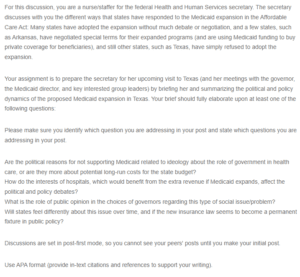Health Policy Process – Political Reasons and the Support for Medicaid Expansion
This discussion addresses question one, “Are the political reasons for not supporting Medicaid related to ideology about the role of government in health care, or are they more about potential long-run costs for the state budget?”
Political Reasons and the Support for Medicaid Expansion
Are you interested in obtaining help on your assignment ? Reach out to us.
Rick Perry, a former governor of Texas, decided to reject the Affordable Care Act’s (ACA) requirement to expand Medicaid a few years ago. He accomplished this using the Supreme US Court 2012 appeal, which declared the extension voluntary (Chen et al., 2019). Since Medicaid’s founding during the reign of President Johnson, the fifty union states have operated their own Medicaid schemes with their unique needs, despite this being the responsibility of the federal cabinet to verify that the underprivileged and disabled have access to sufficient medical insurance.
Texas rejected the Medicaid coverage for two reasons, according to the judgment. The state may consider the federal cabinet’s increasing reach as an abuse of its federalist powers. Since the federal cabinet dictates how each state should administer its Medicaid scheme, the historically state-controlled Medicaid scheme is becoming more of a government plan (Chen et al., 2019). The ACA requires that the conditions be met. The state’s expenses are rising due to Medicaid coverage, which might pressure the government’s economy and the federal debt even if the federal cabinet covers between 50 and 75 per cent of the expenses.
Texas has historically been supporting the Republican Party. They are worried about budgetary increases and believe that a fiscal government, fewer rules, and lower taxes are preferable. Despite the Texas legislature not wanting to participate in Medicaid coverage for economic and political considerations, they are sacrificing the money the ACA invests in the scheme (Knickman & Elbel, 2019). While Texas people continue paying the government taxes to support the scheme despite refusing to comply with the coverage requirements, Texas loses out on the scheme’s financial benefits due to the state’s disinterest. The increased government Medicaid funding might be utilized to create healthcare jobs and provide low-income and disabled people with insurance.
Medicaid also has the burden of being perceived as a scheme for distributing resources and encouraging dependency on the state rather than self-care. Medicaid coverage aims to provide more insurance for many Americans without health insurance (Knickman & Elbel, 2019). Medicaid should be the primary source of medical insurance in the US due to the expansion.
References
Chen, L., Madubuonwu, J., Pecos-Duarte, C., & Sommers, B. D. (2019). Medicaid expansion in Texas: Potential economic and employment implications. The Commonwealth Fund.
Knickman, J. R., & Elbel, B. (Eds.). (2019). Jonas and Kovner’s Health Care Delivery in the United States. Springer Publishing Company.
ORDER A PLAGIARISM-FREE PAPER HERE
We’ll write everything from scratch
Question 
For this discussion, you are a nurse/staffer for the federal Health and Human Services secretary. The secretary discusses with you the different ways that states have responded to the Medicaid expansion in the Affordable Care Act: Many states have adopted the expansion without much debate or negotiation, and a few states, such as Arkansas, have negotiated special terms for their expanded programs (and are using Medicaid funding to buy private coverage for beneficiaries), and still other states, such as Texas, have simply refused to adopt the expansion.

Health Policy Process – Political Reasons and the Support for Medicaid Expansion
Your assignment is to prepare the secretary for her upcoming visit to Texas (and her meetings with the governor, the Medicaid director, and key interested group leaders) by briefing her and summarizing the political and policy dynamics of the proposed Medicaid expansion in Texas. Your brief should fully elaborate upon at least one of the following questions:
Please make sure you identify which question you are addressing in your post and state which questions you are addressing in your post.
Are the political reasons for not supporting Medicaid related to ideology about the role of government in health care, or are they more about potential long-run costs for the state budget?
How do the interests of hospitals, which would benefit from the extra revenue if Medicaid expands, affect the political and policy debates?
What is the role of public opinion in the choices of governors regarding this type of social issue/problem?
Will states feel differently about this issue over time, and if the new insurance law seems to become a permanent fixture in public policy?
Discussions are set in post-first mode, so you cannot see your peers’ posts until you make your initial post.
Use APA format (provide in-text citations and references to support your writing).